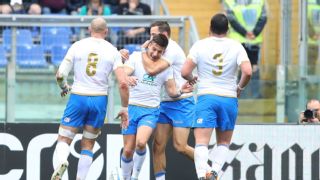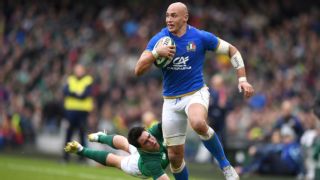|
So, another Six Nations -- the 19th since the tournament was extended to incorporate Italy -- has come and gone. Perhaps more than any of the previous championship campaigns extending back to the 1880s, this was the year of the Irish, with a third Grand Slam clinched in the most impressive manner possible, outplaying the reigning champions on their own turf. But if that, rightly, was the headline story, there are others to be found as we look at the 2018 Six Nations By The Number. 2 drop goals hardly represented a numerical revival for the endangered species of the game's scoring system since it was the same number as in 2017, itself the second lowest tally of the entire Six Nations era. But it came roaring back into relevance with perhaps the most extraordinary drop in the tournament's entire history. Jonathan Sexton's added-time opening day clincher in Paris, struck from long distance after the Irish had run through an improbable 41 phases. The rest of Ireland's mountingly authoritative season flowed from, and was made possible by, that moment. 3 consecutive whitewashes for Italy, equalling the unwanted record set by Scotland between 1952 and 1954, and involving 15 matches to the Scots' 12. Just squeezed out by the Scots in the final match of 2018, the Italians have now lost 17 in a row and will have to get something from their 2019 opener at Murrayfield if they're to avoid setting a new record for consecutive defeats, breaking their tie with the French teams who lost 17 in a row between 1911 and 1920. 4 tries for fullback Matteo Minozzi, the most ever by an Italian in a championship campaign, in his debut season breaking the record of three held previously by Carlo Checchinato, Mirco Bergamasco [twice] and Martin Castrogiovanni. In any normal year he would have been a shoo-in as the tournament's best newcomer. 6 tries conceded by France for the second season running, both years in which they had the tournament's tightest defence but fell short of fulfilling the belief which holds that such a record is usually accomplished by a championship. It is not too hard to look for the reason -- France's 16 tries over the same period are the fewest by any of the Six Nations. And while tries aren't everything, the average of 2.8 per match when France have played in the last two seasons, compared to a norm of 5.8 in other matches, suggests they're some way short of winning any prizes for entertainment. 7 yellow cards were issued during the 2018 championship, the fewest in a decade and continuing a downward trend from 15 in 2015, 12 in 2016 and eight in 2017. Funny to think that there were fears, when the 2017 tournament began, of a flurry of game-changing cards as the new high tackle regulations were enforced.  7 tries for Ireland's new wing Jacob Stockdale disturbed some ancient entries in the record books. It is the most in a single season since Scotland's Ian Smith crossed for eight in 1925, also a Grand Slam campaign. Stockdale's tally is the most ever by an Irishman, smashing the previous mark of five laid down by Jack Arigho (1928), Brian O'Driscoll (2000) and Tommy Bowe (2012). Unsurprisingly, it is the also the most by a player in his debut championship, overtaking the six scored by two Englishmen, Vincent Coates in 1913 [his only season] and Carson Catcheside in 1924. Stockdale also became the first player to score more than once in three consecutive games since Cyril Lowe in England's final matches before the First World War. 10 Grand Slams have been recorded in the first 19 years of the Six Nations, compared to eight in the final 19 of the Five Nations. 15 Six Nations defeats have been suffered by Italian prop Andrea Lovotti, an ever-present since his debut at the start of the 2016 season. Greig Laidlaw's late penalty in Rome on Saturday kept the other side of the ledger blank, enabling Lovotti to overtake teammates Leonardo Sarto and Michele Compagnaro, neither of whom played this season, for the unwanted title of the player who has made most championship appearances without playing on a winning side. 17 tries have now been scored in Six Nations rugby by George North, making him comfortably the leader among active players ahead of Stuart Hogg and Jonathan Joseph, who both have 10. North's two tries against Italy pushed him up to seventh in the all-time list, leapfrogging the formidable quartet of Ben Cohen, Gerald Davies, Ken Jones and Willie Llewellyn. Two more will take him into the top four, behind only O'Driscoll (26), Ian Smith (24) and Shane Williams (22). 20 tries were scored by Ireland in clinching their Grand Slam, their most ever in a single season overtaking the previous mark of 17 in 2000, 2004 and 2007. This was also the first time they have averaged four tries per match across an entire campaign, with 12 tries in 1928 their highest ever during the four-match era. 20 years had passed since the last championship campaign to feature more tries than penalty goals. This season's tally of 78 tries and 54 penalties follows on from 55 and 44 respectively in 1998, the penultimate year of the Five Nations.  22 points, including two tries, by Tommaso Allan for Italy against Scotland in that grippingly tight final-day contest were the most in tournament history by a player who finished on the losing side, overtaking the 21 claimed by Maxime Machenaud from seven penalties when France lost to England two years ago. Only one player, Diego Dominguez with 29 in their never-to-be-forgotten tournament debut against reigning champions Scotland in 2000, has scored more points for Italy in a Six Nations match 30 appearances from the bench by Irish hooker Sean Cronin, a unique Six Nations career without a single start. Cronin overtook Ronan O'Gara's record of 22 caps from the bench back in 2015, but merits a mention this time for reclaiming his spot as Rory Best's deputy after more than a year out of the team and so being on the pitch for the final stages of all five victories. The next longest replacement-only Six Nations career is owned by compatriot Ian Madigan with 12 caps. 33 wins by England in the nine seasons dating back to 2010 make them, in spite of this season's downturn, the all-but certain champions of the decade which will end [except for those who take a different view of decades] next year. Wales have 29 wins and Ireland 27. France's 23 wins means they will almost certainly finish fourth, their worst performance since the 1920s. 36 years and 129 days was the age of Scottish hooker Scott Lawson when he made his first Six Nations appearance for four years as a replacement at Cardiff and deprived Best, who is 35, of his customary spot as the oldest player in the tournament 38 appearances in winning teams make Best the leader among active players and fifth on the all-time list headed by O'Driscoll (45). He overtook Hartley (36) as the active leader during the season. An English victory over Ireland would have left them tied on 37 both for the active lead and the most wins by hookers. 50 points made Machenaud the tournament's leading scorer for the first time, a single point ahead of Leigh Halfpenny. It is the lowest leading figure, joint with 2008 and 2011, of the Six Nations era. The last season when nobody reached 50 points was 1994, when Neil Jenkins' 48 was highest.  65 Six Nations appearances, all starts, by Sergio Parisse, equals the all-time record previously set by O'Driscoll. Losing to Scotland made him the first player defeated in 100 international matches, while he also overtook Castrogiovanni as the most defeated player in tournament history [now 54] and, with the loss to England, the most defeated by a single championship opponent (14). Previous holders of the championship most-defeated record include Mike Gibson, Sandy Carmichael and Willie John McBride, while the seven baseball pitchers with the most career losses are all in the Hall of Fame, making records of this sort more a measure of greatness than of failure. 73.33 percent Six Nations winning percentage for Eddie Jones remains pretty impressive, but dropped 16.67 percent during the season to below the 80 percent recorded by predecessor Stuart Lancaster, which suggests that 2012 to 2015 wasn't quite the waste land for England that is sometimes painted. 78 tries were scored during the 2018 Six Nations, overtaking the previous record of 75 set in 2000 and subsequently equalled in the following two seasons. Jonny May's added-time score against Ireland, his 4th try of the season, was the record-breaker. But the average of 5.2 tries per match still falls slightly short of the record for shorter seasons -- 55 in 10 matches in 1998 and 35 in six in 1938 -- suggesting that years with an '8' in them are guaranteed to upset defence coaches. 145 consecutive championship matches saw England score at least some points with the boot before the complete blank drawn against Ireland in the final round, the last time being in the 17-0 defeat at Lansdowne Road in 1987. Last time they failed to score with a kick at Twickenham was the 3-3 Calcutta Cup match in 1965 remembered for the extraordinary length of the field equalising try by England wing Andy Hancock. 388 career points make Leigh Halfpenny the highest championship scorer among active players and the sixth of all time behind all-time record holder Ronan O'Gara (557). Sexton (357) and Owen Farrell (343) remain in close pursuit with Farrell, who is 26 to Halfpenny's 29 and Sexton's 32, the clear long-term threat to O'Gara in spite of an odd year at Twickenham in which he landed only two points against Wales and failed to score at all, for the first time in his 29 championship appearances, against Ireland 672 points were scored during the season, an average of 44.8 per match and just over a point a game above the 653 scored in 2017. The record remains the 803 scored in the first Six Nations campaign back in 2000.
|

